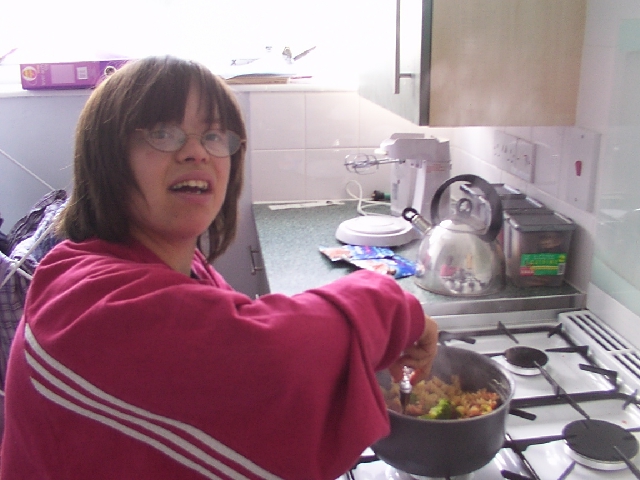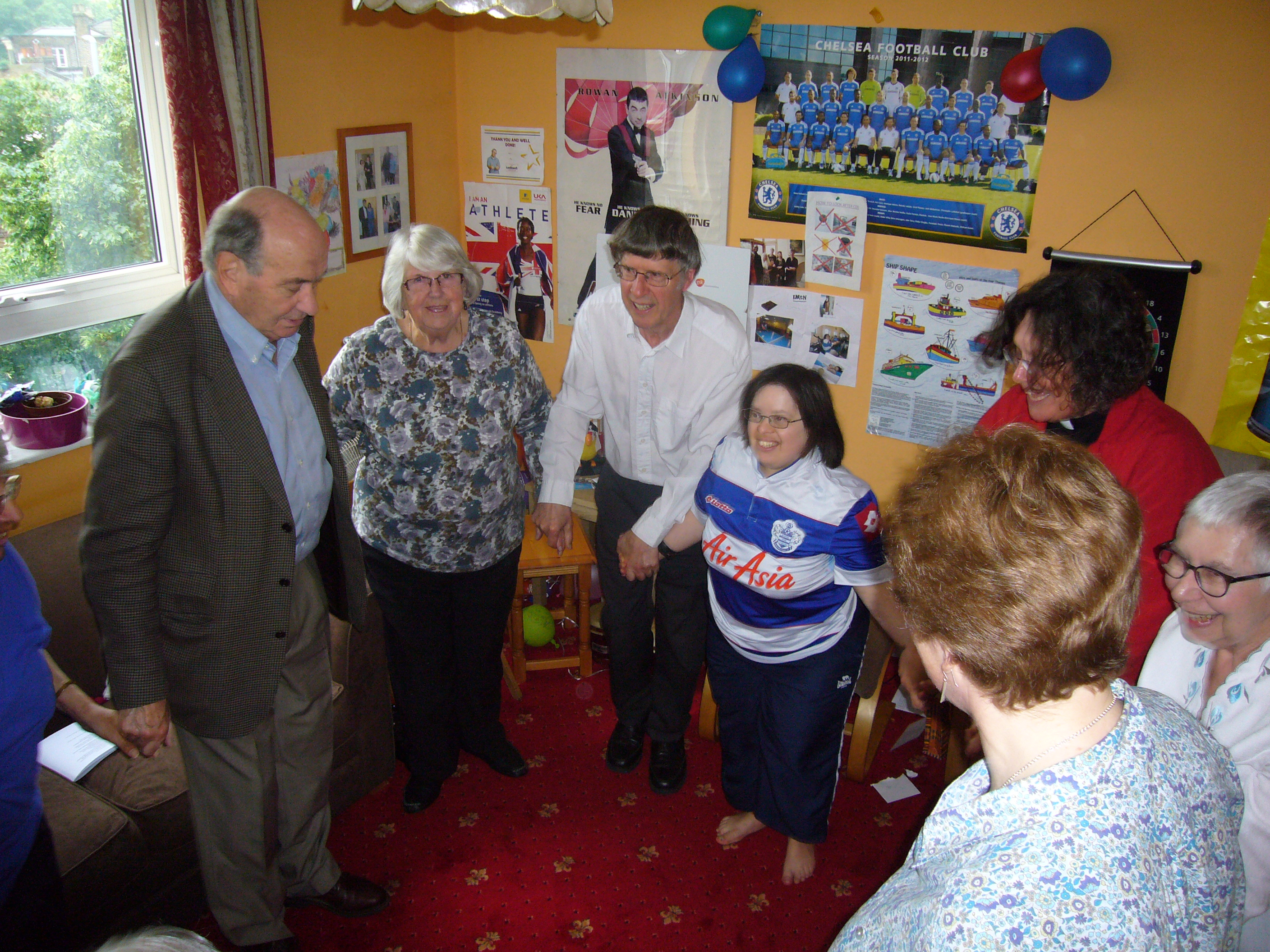|
|
|
 |
|
In June 2004 our 25-year-old daughter moved into her own flat. When Karen was two months old, I had met the mother of 31-year-old woman with Downs Syndrome. Her advice to me was not to wait until Karen was 31 before she moved out of the family home. She wished she had found somewhere when her daughter was much younger. I also had seen other families where 70 year old parents had been caring for their 40 year old sons or daughters with Downs Syndrome and I was determined that this was not where we wanted to be when we were 70 and Karen was 40. Karen has Shared Ownership with a Housing Association, which gives her more security than an ordinary tenant Social Services has paid money into a Direct Payments Trust. My husband, my brother and myself are the three trustees. She receives support to live independently from four support workers each of whom work about 19 hours a week paid for by the Trust. .From 1997-2000 Karen attended Derwen College in Shropshire where she benefited enormously in learning new skills, both social and academic and experienced living away from home, following in her sister’s footsteps who had spent three years away at University. .A year after Karen left Derwen she and another young man with Downs Syndrome moved into a three bedroom flat with sleep in staff employed by one agency and with day time support paid for my staff from another agency. This experiment failed after nine months. We then looked at a few residential care homes but we soon realised that putting three to four people together into a flat who had nothing in common except their assessed IQ was not a basis for a successful long term Relationship. Unless people are totally compatible and there are enough staff for each resident to choose their own activities, group homes seem to be an unsatisfactory way of providing person centred planning, choice, inclusion and independence. Karen’s flat gives her the opportunity to be fully independent, in the true sense of the word. Karen is a very ordinary average person with Downs Syndrome. She needs someone with her at night and she needs someone with her to help her to cook, to manage her money, to organise social events. Every morning Karen leaves the flat about 8:30 to travel independently by public transport to college. Soon after her return one of her four support workers comes the flat, accompanies her to her youth club and helps her in any way in which she needs help. Independence is not about the ability of disabled people to do every single task for themselves, but much more about the environment in which they live and the ability to make decisions for themselves. Karen decides what she wants to eat and how she wants to spend her leisure, and hundreds of other decisions. .in 2005 when this page was set up, three members of her team were students, one was training to be a learning disability nurse, one was studying occupational therapy and the third was a language student. The fourth is an experienced professional care worker, who has a very positive and enthusiastic attitude about fostering Karen’s independence. Being part- time workers means that they can bring a freshness and new viewpoint to working with Karen which is different from the support she would have had from someone employed full time to work in a group home. T. .Now in 2023 one of her staff are still with us and the others have been with uss for more than 7 years. The occupational therpay student was been replaced by another mature student who was training to be a learning disability nurse and our half Indian half Polish language student was been replaced with a Polish psychology student!. They in turn were replaced by another learning disability nurse.She was replaced by her cousin and the other by a contact of our longest serving care worker. However 8 staff in nearly 20 years is a pretty good record of staff turnover, Another advantage of Direct payments is that Karen, with support from her advocate, and us was able to interview and choose the people who work with her. Karen chose the décor, furniture and equipment. Her bedroom is violet, the staff bedroom bright yellow and the living room a lovely shade of peach. .The flat is only fifteen minutes walk from where we live, so we are near enough to rush round when needed, but far enough away that Karen cannot drop her washing in for me to do. We have been astonished at the progress Karen made in the first four months after she moved into the flat. When she moved in her technical expertise was limited to using a video recorder, a CD player and a microwave but only if someone told her how many minutes the microwave needed.The picture below shows her and her siblings in her kitchen . center>
About 5 months after she moved in , one of her support workers had a class that did not finish until after 5 pm and I was unable to fill the hour’s gap between Karen returning home from college and her support worker arriving. .Claire told me how she arrived at the flat to find the washing machine running, and a meal cooked. Karen had wheeled her folding table from the kitchen to the living room and set it. She had peeled, cooked and mashed potatoes, cooked some vegetables and grilled some fish cakes. Two weeks later another member of staff told me that Karen had started ironing her clothes unaided. .When I speak to Karen on the phone I am impressed by the way her speech has improved. Having to make herself known to people who are not familiar with her quirks of speech has led to improvements in articulation, grammar and her ability to express abstract ideas. .I have done a powerpoint about the advantages of Direct Payments which you can see at,< iframe src= /directpaymentsppg.pptx> I give the reasons why Direct Payments are better because they are- Individualised and Inclusive, they are centred on Involvement and Independence and they have the advantages of Simplicity, Freedom, Flexibility and Choice. Of course there have been hiccups, headaches and sticky moments in these four months but they are minor setbacks and Karen’s air of self confidence and sense of humour are very well developed. Karen knows how to get her own way. The first time a new support worker worked with Karen, they went to the Science Museum. Karen complained that her feet were sore with the “long” walk from the tube station and convinced the young student that she needed a wheelchair. She pushed Karen round the museum with Karen behaving like a royal invalid, however leaping out of the wheelchair whenever an exhibit caught her fancy. Karen has no physical disabilities but decided,” Why walk, when you can ride?” Just one of many examples of Karen making choices. .When Karen had been in her flat for a year we held a flat blessing , conducted by our current minister , who was joined by two other ministers, and some of Karen's friends. Ten years later in 2014 we had another flat blessing this time 4 ordained ministers were present and the service concluded with the Hokey-Cokey ( known for some reason as the Hokey Pokey in the USA) | |||
 |

|
Here are some of my favourite web sites! They are funny and fun. I also listed some personal sites., My parents', brother's and sister's pages and a new site for my cyberfriends